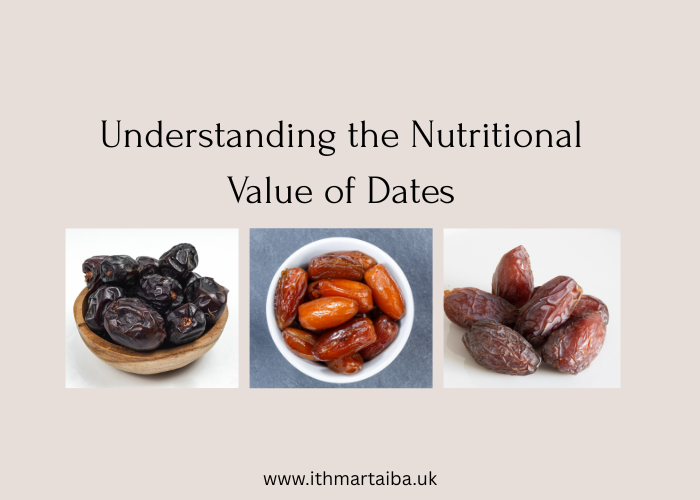No products in the cart.
“Pure, Natural, and Delicious — Dates You Can Trust.”

Understanding the Nutritional Value of Dates
Dates are often described as nature’s candy, but that label doesn’t do justice to their true power. Sweet, chewy, and versatile, dates have nourished civilizations for thousands of years—from ancient Arabian deserts to today’s health-conscious kitchens. By understanding the nutritional value of dates ,we uncover why this timeless fruit is considered both food and medicine.
In this article, we’ll dive into the rich history of dates, their macronutrient and micronutrient profile, antioxidant benefits, calorie myths, and practical ways to add them to your diet. You’ll see why this little fruit has earned the title of a nutritional powerhouse.
Understanding the Nutritional Value of Dates in History and Culture
The story of dates stretches back over 5,000 years. In Middle Eastern traditions, dates were revered as life-sustaining foods. They were often the first item consumed after fasting, valued for their ability to restore energy quickly while soothing digestion.
In Islamic culture, the Prophet Muhammad (PBUH) recommended breaking fast with dates, recognizing their healing and energizing qualities. Similarly, Ayurveda and other traditional systems used dates for fertility, energy, and digestion.
Modern science now validates these ancient practices. When we focus on understanding the nutritional value of dates, it becomes clear that they are more than just a sweet treat—they are a functional food that supports energy, immunity, and long-term wellness.
Macronutrients: Understanding the Nutritional Value of Dates in Energy
At first glance, dates seem like a sugary indulgence. But once you examine their macronutrients, you’ll see why they are superior to processed sweets.
- Natural Sugars (Glucose, Fructose, and Sucrose): These sugars provide quick energy for athletes, students, and anyone needing focus without the crash that refined sugar causes.
- Dietary Fiber: The fiber in dates slows sugar absorption, balances blood sugar levels, and improves satiety. It also supports gut health by feeding beneficial bacteria.
- Low Fat Content: Virtually fat-free, dates deliver energy without adding unnecessary unhealthy fats.
So, while dates are calorie-rich, they are what nutritionists call nutrient-dense calories—offering fuel that comes with fiber, vitamins, and minerals.
Micronutrients: Understanding the Nutritional Value of Dates in Vitamins and Minerals
The true magic of dates lies in their micronutrients. By understanding the nutritional value of dates, we uncover how these small fruits deliver a big punch of vitamins and minerals:
- Potassium: Regulates blood pressure and supports heart and kidney health.
- Magnesium: Aids bone strength, muscle recovery, and nerve function.
- Iron: Essential for oxygen transport and preventing anemia.
- Calcium & Phosphorus: Strengthen bones and teeth.
- Copper & Zinc: Support immunity and red blood cell formation.
- B Vitamins (B1, B2, B3, and B6): Enhance metabolism, brain function, and mood.
- Vitamin K & A (small amounts): Promote blood clotting, skin health, and vision.
Here’s a quick snapshot:
Nutrition Facts: Understanding the Nutritional Value of Dates (per 100g)
|
Nutrient |
Amount |
|
Calories |
66 kcal |
|
Carbohydrates |
18 g |
|
Dietary Fiber |
1.6 g |
|
Natural Sugars |
16 g |
|
Protein |
0.43 g |
|
Fat |
0 g |
|
Sodium |
0.2 mg |
|
Potassium |
167 mg |
|
Calcium |
15.4 mg |
|
Magnesium |
13 mg |
|
Phosphorus |
14.9 mg |
|
Iron |
0.2 mg |
|
Copper |
0.087 mg |
|
Zinc |
0.106 mg |
This profile shows why dates are often called tiny nutrition capsules.
Antioxidants: Understanding the Nutritional Value of Dates in Disease Prevention
Another powerful aspect of understanding the nutritional value of dates is recognizing their antioxidant richness. In today’s world, our bodies are constantly under stress from pollution, processed foods, and free radicals. Left unchecked, these can trigger chronic inflammation and diseases.
Dates contain:
- Polyphenols
- Phenolic acids
- Carotenoids
- Flavonoids
These compounds neutralize free radicals, reduce inflammation, and support cellular repair. Research even suggests that dates may offer anti-cancer, anti-tumor, and neuroprotective benefits.
Understanding the Nutritional Value of Dates and Calories
One of the biggest myths about dates is that they are “too high in calories.” Let’s set the record straight.
- 100 calories from dates ≠ 100 calories from cookies.
- Cookies deliver empty calories (sugar and fat with no nutrition).
- Dates provide nutrient-dense calories—energy plus fiber, minerals, and antioxidants.
For most people, 3–5 dates a day is ideal. Athletes and highly active individuals may need more. The key is moderation and pairing dates with nuts or seeds for balanced energy.
By understanding the nutritional value of dates, we stop fearing calories and start appreciating nutrients.
Key Benefits: Understanding the Nutritional Value of Dates for Health
- Digestive Health: Fiber relieves constipation and supports gut microbiota.
- Sustained Energy: Natural sugars fuel the body without energy crashes.
- Blood Sugar Control: Paired with nuts, dates regulate glucose better than refined sugars.
- Bone Health: Calcium, phosphorus, and magnesium strengthen bones.
- Brain Function: Antioxidants protect memory and reduce neurodegenerative risks.
- Fertility & Hormones: Traditionally used to boost libido and reproductive health.
- Kidney Protection: Potassium helps balance high-protein diets.
- Immunity Boost: Natural antimicrobial compounds support the immune system.
Practical Ways to Enjoy Dates Daily
Knowing the benefits is one thing—making them part of your lifestyle is another. Here’s how:
- Smoothies & Shakes: Blend with almond milk, bananas, and seeds.
- Energy Balls: Combine dates with oats and nuts for a snack.
- Pre-Workout Snack: Eat 2–3 dates with almonds for stamina.
- Traditional Remedy: Boil in milk with saffron for fertility and better sleep.
- Overnight Soak: Helps relieve constipation and boosts digestion.
- Salads & Oatmeal: Chop and add for natural sweetness.
- For Kids: Replace sugary spreads with date paste.
Understanding the Nutritional Value of Dates in Moderation
Even though dates are healthy, balance matters.
- For Diabetics: Controlled diabetics can enjoy dates, but always pair with fiber-rich foods.
- For Weight Loss: Stick to moderate portions to avoid calorie overload.
- For Sensitive Individuals: Choose organic or naturally dried dates to avoid sulfite exposure.
FAQs: Understanding the Nutritional Value of Dates
- How many dates can I eat daily?
Most people benefit from 3–5 dates, while athletes may need more. - Do dates spike blood sugar?
Not significantly, especially when eaten with nuts or after meals. - Can dates replace desserts?
Yes! They are a healthier substitute for refined sugar in smoothies and baking. - Are dates good for digestion?
Absolutely. Their soluble fiber improves gut health. - Do dates give better energy than caffeine?
Yes. Dates provide steady energy without the crashes linked to caffeine.
Final Thoughts on Understanding the Nutritional Value of Dates
-
Dates are more than a sweet indulgence—they are nature’s nutritional gems. By understanding the nutritional value of dates, we learn that they offer energy, fiber, antioxidants, and essential minerals in one perfect package.
Instead of fearing their calories, embrace them as a daily health investment. Whether you’re boosting energy, improving digestion, supporting fertility, or simply replacing refined sugar, dates are one of the smartest foods you can add to your diet.
👉 Ready to enjoy premium, farm-fresh dates straight from Madinah? Visit IthmarTaiba Dates today and bring home the sweetness of health and tradition.
Disclaimer: The data for this article is curated from various sources on the internet. We do not take responsibility for the accuracy of this data.




